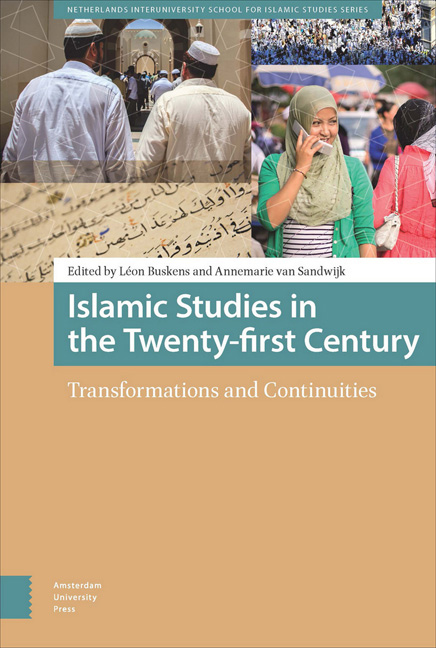Book contents
- Frontmatter
- Dedication
- Contents
- Preface
- Introduction: Dichotomies, Transformations, and Continuities in the Study of Islam
- Islamic Texts: The Anthropologist as Reader
- Textual Aspects of Religious Authority in Premodern Islam
- What to Do with Ritual Texts: Islamic Fiqh Texts and the Study of Islamic Ritual
- Textual Study of Gender
- Scholarship on Gender Politics in the Muslim World: Some Critical Reflections
- Power, Orthodoxy, and Salvation in Classical Islamic Theology
- Dialectical Theology in the Search for Modern Islam
- “Classical” Islamic Legal Theory as Ideology: Nasr Abu Zayd’s Study of al-Shafiʿi’s al-Risala
- Islamic Law in the Modern World: States, Laws, and Constitutions
- Vernacular Cosmopolitanism as an Ethical Disposition: Sufi Networks, Hospitality, and Translocal Inclusivity
- Middle Eastern Studies and Islam: Oscillations and Tensions in an Old Relationship
- Notes on Contributors
- Overview of NISIS Autumn Schools, 2010-2014
- Index
Scholarship on Gender Politics in the Muslim World: Some Critical Reflections
Published online by Cambridge University Press: 12 December 2020
- Frontmatter
- Dedication
- Contents
- Preface
- Introduction: Dichotomies, Transformations, and Continuities in the Study of Islam
- Islamic Texts: The Anthropologist as Reader
- Textual Aspects of Religious Authority in Premodern Islam
- What to Do with Ritual Texts: Islamic Fiqh Texts and the Study of Islamic Ritual
- Textual Study of Gender
- Scholarship on Gender Politics in the Muslim World: Some Critical Reflections
- Power, Orthodoxy, and Salvation in Classical Islamic Theology
- Dialectical Theology in the Search for Modern Islam
- “Classical” Islamic Legal Theory as Ideology: Nasr Abu Zayd’s Study of al-Shafiʿi’s al-Risala
- Islamic Law in the Modern World: States, Laws, and Constitutions
- Vernacular Cosmopolitanism as an Ethical Disposition: Sufi Networks, Hospitality, and Translocal Inclusivity
- Middle Eastern Studies and Islam: Oscillations and Tensions in an Old Relationship
- Notes on Contributors
- Overview of NISIS Autumn Schools, 2010-2014
- Index
Summary
Introduction
What do we mean by “gender politics”? What is the political in “gender” and in what ways are politics and policies “gendered”? How do these terms relate to feminist politics? Whose feminist politics are we talking about, in a contemporary era in which scholarly research and activism is conducted through increasingly transnational networks? Can we still assume the existence of a single, feminist project that guides research on gender politics in the Muslim world?
As a first step towards addressing these questions, this essay traces important developments in social science gender studies and feminist scholarship that shaped debates among scholars located in the US and UK academe. In a second step, I will reflect on how these different paradigms of research on gender and gender politics have affected scholarship on and from the Middle East. Next, I will offer some critical reflections on key points and limitations of the debates raised by this scholarship in and on the Middle East, by addressing them from “the margins,” that is, from the vantage point of Africanist anthropological scholarship on gender. Drawing on this perspective – and this is the fourth step – I will propose certain perspectives that might benefit social science research on gender – both with respect to the Middle East and to Muslim societies that have not been granted similar canonical status in the literature.
Social Science Research on Gender Studies and Feminist Theory: A Short Overview
Developments within gender studies and feminist theorising since, roughly, the 1960s manifested themselves in several significant paradigm shifts. These shifts need to be related not only to dominant trends within the social sciences, but also to reconfigurations in the institutional arrangements of higher education and academic research (see Vincent 1990; Kandiyoti 1996; also see Guyer 2004).
Transcending the “Male Bias”: Women's Studies
Early studies that applied a gender-specific perspective to the study of society were informed by the effort to correct the “male bias” characteristic of much classical scholarship in sociology and anthropology. Yet during this early phase of gender-relevant theorising and empirical inquiry, the main category of investigation was “woman,” rather than “gender”.
- Type
- Chapter
- Information
- Islamic Studies in the Twenty-first CenturyTransformations and Continuities, pp. 109 - 134Publisher: Amsterdam University PressPrint publication year: 2017



